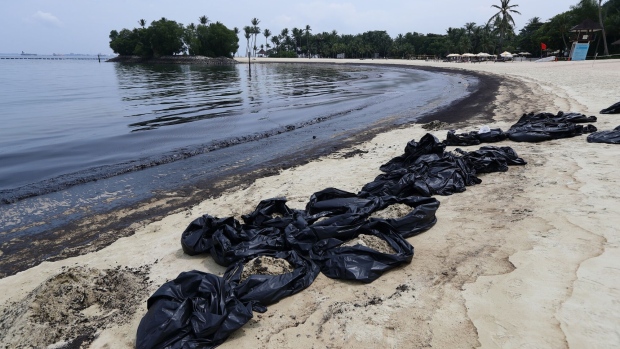Jun 16, 2024
Singapore Works to Clean Up 30km Oil Slick After Tanker Accident
, Bloomberg News

(Bloomberg) -- Like most residents in Singapore’s expensive seaside enclave on the resort island of Sentosa, Odhran Dodd’s weekend began with the stink of oil fumes.
“Oh, you could smell it from seven o’clock this morning,” Dodd said on Saturday at Sentosa Cove, a development favored by wealthy expats. “We certainly don’t get anything as putrid as this.”
The beach shore where his four- and seven-year-old often play was coated black on Saturday after an oil spill the previous afternoon, when Netherlands-flagged dredger Vox Maxima hit and ruptured the bunker-fuel vessel Marine Honour at the Pasir Panjang Terminal up the coast.
Sentosa Development Corp., which manages the island, was alerted on Friday night to “instances of oil spillage in the sea waters” around one of its popular beaches as a result of the accident, according to a notice sent to Sentosa residents on Saturday.
The Maritime and Port Authority of Singapore had said on Friday evening that the affected cargo tank had been isolated “and the spill contained.” By the following day, the extent of the contamination became clear and a joint government statement including the MPA and environment agency said that the MPA and contractors had mobilized 18 response craft and deployed oil booms, dispersants and skimmers to reduce the impact of the spill.
Long Weekend
The incident occurred at the start of a long holiday weekend, at a time when ship traffic at the nation’s ports is more congested than usual as tankers and other vessels avoid the Red Sea over fears of missile attacks.
A tidal current had carried treated oil to the beaches of Sentosa and East Coast Park near to the international airport in the east of the island, a distance of more than 30 kilometers (18 miles), according to the government. It didn’t say how much oil was spilled.
“This is a very large area to clean up,” said Sue Ye, founder of local conservation group Marine Stewards. She estimated it would take a week or more to clear the oil and there could be longer-term repercussions for marine wildlife, corals and intertidal areas. “We have seen cases of affected wildlife covered in oil, such as kingfishers, monitor lizards and otters. We have also had reports on dead fish and a dead sea snake.”
Several beaches will remain closed until further notice, according to a separate statement Sunday. Almost 1,500 meters of container booms have been deployed since Friday and another 1,600 meters will be laid over the next few days to prevent further spread of the oil. Recovery efforts at sea will also be bolstered by specialized devices to concentrate oil on the surface for removal.
“The oil spill is a growing environmental catastrophe that is impacting some of the region’s most important and biodiverse marine protected areas and fisheries,” said Heng Kiah Chun, regional campaign strategist for Greenpeace. “It’s impossible to fully clean up an oil spill. The government must mandate the companies concerned go beyond ‘clean-up’ and pay reparations for the environmental destruction.”
Breathing oil vapors can also cause headaches, nausea, dizziness, fatigue, and coughing, as well as increasing the likelihood of anxiety and depression, according to a 2016 study.
Greek restaurant Blu Kouzina, 50 meters from the water on Sentosa’s Palawan Beach, had 55 cancellations for lunch on Saturday and would have to close on Sunday, said manager Samsul Ariff. Some staff felt unwell and suffered headaches, he said.
“We are always full on Saturdays,” Samsul said, standing in front of the near-empty restaurant. He called the incident a “disaster” and said the few customers that had turned up on Saturday left halfway through their meals because of the foul smell. Revenue on the day fell to about S$2,000 ($1,478), compared with typical takings of S$10,000 to S$12,000.
Nearby food trucks also had few customers and a planned National University of Singapore camp at the beach was relocated.
Yacht Charters
Yacht Bookings Singapore had to postpone all eight charters on Saturday as well as Sunday’s six, with more expected to follow over the next few days. The spill also affected waters off Lazarus Island, a popular site for weekend day-trippers on yachts, the Straits Times reported.
“No one wanted oily hair and body,” Yacht Bookings’ Director Kiran Sujanani said. She added the oil could also affect vessels’ hulls and machinery. “Navigating through contaminated areas can pose safety and environmental risks, leading us to temporarily suspend operations in affected zones.”
The spill was the biggest to impact the nation’s coastline since the MT Bunga Kelana 3 lost 2,500 tons of crude oil after a collision with a bulk carrier 13 kilometers off the southeast coast in 2010. The island’s worst oil pollution was in 1997 when the Cyprus-flagged Evoikos collided with the Thai-registered Orapin Global, a Very Large Crude Carrier, spilling more than 28,000 tons of oil.
Not everyone was put off by the pollution and smell on Saturday. Alvin Seah, a 24-year-old civil engineering student, said at about 4 pm on Saturday that he had been playing volleyball on Tanjong Beach since 10 am despite feeling some dizziness in the morning. He said one friend had left after about an hour due to the fumes.
The usually full Tanjong Beach Club only had a fraction of its usual weekend crowd. Scattered tables with a handful of diners looked over the shoreline, which was blocked off with tape and a sign warning: “Oil slick spotted. Clean up in progress. Please stay clear of water.”
At neighboring Palawan and Siloso Beach, sunbathers lay on unpolluted sand in front of a line of red and white tape, hastily erected to prevent people from going near the oil slick. Some had even brought their dogs.
Workers were seen feeding oil booms into the water. The floating barriers were installed to “prevent further contamination,” according to a notice sent to Sentosa Cove residents on Saturday morning by Knight Frank Property & Facilities Management on behalf of Sentosa Cove Resort Management.
While he hoped for a rapid cleanup, Blu Kouzina’s Samsul feared that it could impact business for a long time.
“I know oil spills can be very bad,” said Samsul, who stated on Saturday that he had not been informed of an estimated timeline for the cleanup operation. “I don’t know how long it’s going to take them for this.”
--With assistance from Anders Melin, Serene Cheong, Aradhana Aravindan and Sing Yee Ong.
(Updates with comment from conservation group, latest progress with cleanup in the eighth and ninth paragraphs)
©2024 Bloomberg L.P.






